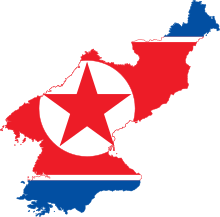 The North Korea Portal The North Korea PortalIntroduction North Korea, officially the Democratic People's Republic of Korea (DPRK), is a country in East Asia. It constitutes the northern half of the Korean Peninsula and borders China and Russia to the north at the Yalu (Amnok) and Tumen rivers, and South Korea to the south at the Korean Demilitarized Zone. The country's western border is formed by the Yellow Sea, while its eastern border is defined by the Sea of Japan. North Korea, like its southern counterpart, claims to be the sole legitimate government of the entire peninsula and adjacent islands. Pyongyang is the capital and largest city. The Korean Peninsula was first inhabited as early as the Lower Paleolithic period. Its first kingdom was noted in Chinese records in the early 7th century BCE. Following the unification of the Three Kingdoms of Korea into Silla and Balhae in the late 7th century, Korea was ruled by the Goryeo dynasty (918–1392) and the Joseon dynasty (1392–1897). The succeeding Korean Empire (1897–1910) was annexed in 1910 into the Empire of Japan. In 1945, after the Japanese surrender at the end of World War II, Korea was divided into two zones along the 38th parallel, with the north occupied by the Soviet Union and the south occupied by the United States. In 1948, separate governments were formed in Korea: the socialist and Soviet-aligned Democratic People's Republic of Korea in the north, and the capitalist, Western-aligned Republic of Korea in the south. The Korean War began when North Korean forces invaded South Korea in 1950. In 1953, the Korean Armistice Agreement brought about a ceasefire and established a demilitarized zone (DMZ), but no formal peace treaty has ever been signed. Post-war North Korea benefited greatly from economic aid and expertise provided by other Eastern Bloc countries. However, Kim Il Sung, North Korea's first leader, promoted his personal philosophy of Juche as the state ideology. Pyongyang's international isolation sharply accelerated from the 1980s onwards as the Cold War came to an end. The fall of the Soviet Union in 1991 then brought about a sharp decline to the North Korean economy. From 1994 to 1998, North Korea suffered a famine with the population continuing to suffer from malnutrition. In 2024, the DPRK formally abandoned efforts to peacefully reunify Korea. North Korea is a totalitarian dictatorship with a comprehensive cult of personality around the Kim family. Amnesty International considers the country to have the worst human rights record in the world. Officially, North Korea is an "independent socialist state" which holds democratic elections; however, outside observers have described the elections as unfair, uncompetitive, and pre-determined, in a manner similar to elections in the Soviet Union. The Workers' Party of Korea is the ruling party of North Korea. According to Article 3 of the constitution, Kimilsungism–Kimjongilism is the official ideology of North Korea. The means of production are owned by the state through state-run enterprises and collectivized farms. Most services—such as healthcare, education, housing, and food production—are subsidized or state-funded. North Korea follows Songun, a "military first" policy which prioritizes the Korean People's Army in state affairs and the allocation of resources. It possesses nuclear weapons. Its active-duty army of 1.28 million soldiers is the fourth-largest in the world. In addition to being a member of the United Nations since 1991, North Korea is also a member of the Non-Aligned Movement, G77, and the ASEAN Regional Forum. (Full article...) Selected article -Rason (formerly Rajin-Sŏnbong; Korean pronunciation: [ɾa.sʌ̹n, ɾa.dʑin.sʰʌ̹n.boŋ]) is a North Korean special city and ice-free port in the Sea of Japan in the North Pacific Ocean on the northeast tip of North Korea. It is in the Kwanbuk region and location of the Rason Special Economic Zone. In South Korean pronunciation, the initial "R" of the name is pronounced as "N", (나선, Naseon) as per standard Korean phonology. In 2000, the name was shortened from "Rajin-Sŏnbong" to "Rason". During the 1930s, the Japanese called it Rashin; at that time, it was an important port at the end of a railroad line. It fell under the control of the Red Army on 14 August 1945. Before 1991, Rason was used by the Soviet Union as an alternative warm-water port in case Vladivostok was unavailable. The Soviet naval facilities were built starting in 1979. From 1993 to 2004, it was administered separately from North Hamgyŏng as the directly governed city (Chikhalsi) of Rason. Prior to 1993 and from 2004 to 2009, the city had been part of the North Hamgyŏng Province. Since 2010, the city is a "special city", again breaking from provincial control, but different from its older designation as a directly governed city. What this means in practice is unclear. (Full article...)CategoriesRelated portalsCommunist countries in Asia Other countries North Korea in the news
Selected image -
Arirang Mass Games in Pyongyang
Did you know (auto-generated)
More did you know
General images -The following are images from various North Korea-related articles on Wikipedia.
North Korea topicsThings you can do
Associated WikimediaThe following Wikimedia Foundation sister projects provide more on this subject:
Web resources
Notes Discover Wikipedia using portals |













































